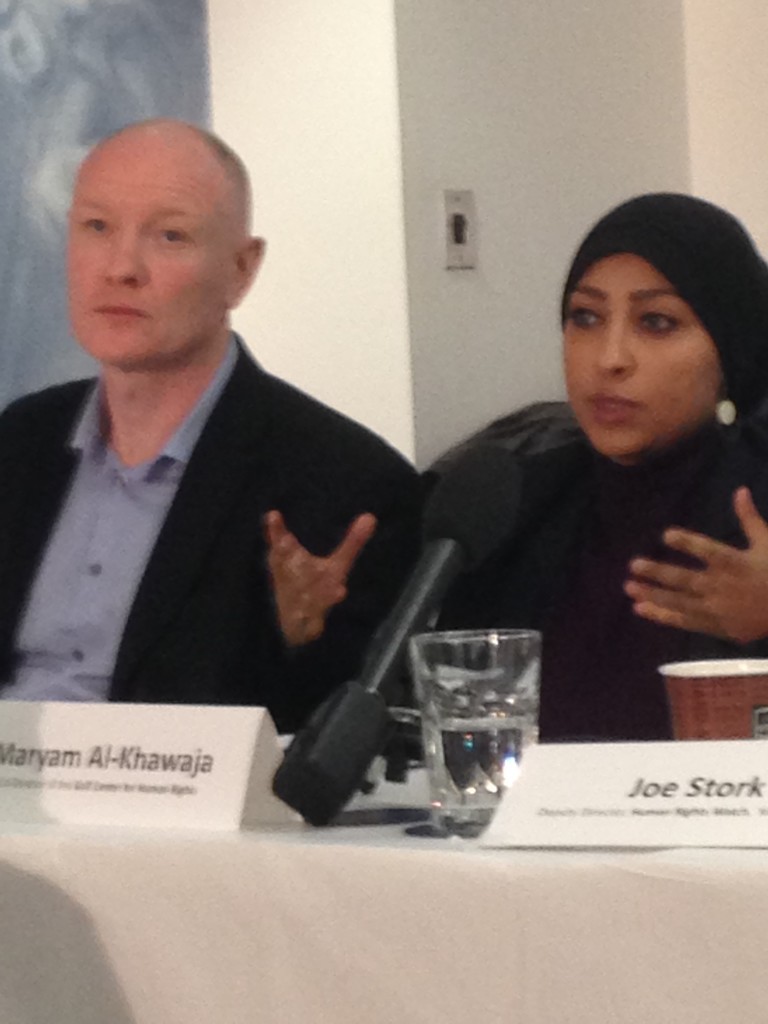On 14 November 2014, six leading human rights NGOs held a discussion in Washington, DC on human rights violations by Gulf countries that are partners of the United States in the fight against ISIS. “Criminalization of Dissent in Bahrain, Saudi Arabia and the United Arab Emirates” put the focus on countries which routinely jail those who advocate democratic reform and protection of human rights, while ignoring or encouraging those who promote violence and sectarianism.
Two human rights defenders who were recently jailed in Bahrain, Maryam Al-Khawaja and Nabeel Rajab, joined the panel – Rajab via skype because he is under a travel ban since his recent arrest in October. The panel made recommendations for how US policy can address the roots of extremism in the Gulf and the policies of its Gulf allies that criminalize peaceful dissent and persecute human rights defenders – including Rajab, President of the Bahrain Center for Human Rights, who was jailed on charges of “insulting state institutions” via Twitter.
“The US government should destroy and degrade sectarianism within these countries by promoting civil society and protecting human rights defenders. The way to fight terrorism is with more human rights, not less,” said Brian Dooley, director of the Human Rights Defenders program at Human Rights First, which hosted the event. “The suffocation of civil society in Saudi Arabia, the UAE and Bahrain only foments the sort of extremism and sectarianism that gives rise to ISIS,” he noted. The US has a strong military relationship with these three countries and could be leveraging that alliance to help protect human rights defenders.
For example, when US officials visit the Gulf next month as part of the Manama Dialogue they should publicly call for the release of human rights defenders jailed for peaceful dissent, including those imprisoned under so-called counter terrorism laws. The US should consider visa bans and asset freezes against those it believes are responsible for human rights violations.
“We have to put people before profit,” said Khalid Ibrahim, GCHR Co-Director, calling on the US administration “to use its influence to ensure the release of all the detained HRDs in the region and that they are able to carry out their legitimate human rights activities without fear of reprisals.”
British lawyer Melanie Gingell noted that the new anti-terrorism law in the Emirates has the potential to be used as yet another tool to crack down on human rights defenders, including GCHR Advisory Board member Ahmed Mansoor, who should have been at the event. His twitter account was recently hacked and he faces constant persecution for his online commentary, including a travel ban.
As moderator of the event, Joe Stork, deputy director of Human Rights Watch’s MENA division, pointed out the pattern of harassment of human rights defenders across the entire Gulf region, including in Kuwait, Oman and Qatar as well. He said that the US and other allies could attend trials of human rights defenders to give their support, and the US could name names in the daily State department briefings. Rajab believes he was released on 2 November due to international pressure, in part because the US called for his release and not just a “fair trial” or a reduced sentence. Yet his friends Abdulhadi Al-Khawaja is still in jail, as is his daughter Zainab Al-Khawaja due to one of her many free expression cases. Her verdict is on 4 December, one day after she is due to give birth.
The night before the event, over 15 young women were arrested during night raids, including two pregnant women and one woman with a seven-month old baby. “This is a conservative society, and they are provoking people to protest so there will be protests during the elections and the government can make excuses,” said Maryam Al-Khawaja, Co-Director of the Gulf Center for Human Rights (GCHR). “They are creating an environment for the elections on 22 November to have a low turnout so the government can be in control.”
“There is an undeclared war of cleansing in a peaceful manner in Bahrain that is economic, social and cultural,” said Rajab noting the disparities between opportunities for different sects. “In other countries, people change the government. In Bahrain, the government changes us,” he commented. Preferential treatment of jobs and education for Sunni newcomers is changing the makeup of the population, and some people are being deprived of their citizenship.
Al-Khawaja said that “Saudi Arabia is confident enough that they can get away with persecuting people who cooperate with the UN mechanisms,” even though the country is a member of the UN Human Rights Council. Many human rights defenders are in jail on lengthy sentences like Waleed Abu Al-Khair and Raif Al-Badawi, also sentenced to 1000 lashes, possibly starting with 50 lashes to be carried out on the same day as the event. “For others, they keep the threats of charges hanging to keep you silent.” Al-Khawaja noted a dangerous new cooperation between the GCC which allows Gulf countries to arrest any Gulf national facing charges.
Rajab concluded, “Military relations should not take priority over human rights. Allies need to take on the positive role to promote human rights in the Gulf.”
The event was organized by the Gulf Center for Human Rights in partnership with Americans for Democracy and Human Rights in Bahrain, Human Rights Watch, Human Rights First, the Project on Middle East Democracy (POMED) and CIVICUS: World Alliance for Citizen Participation.
View the full pdf versions in English and Arabic here.





